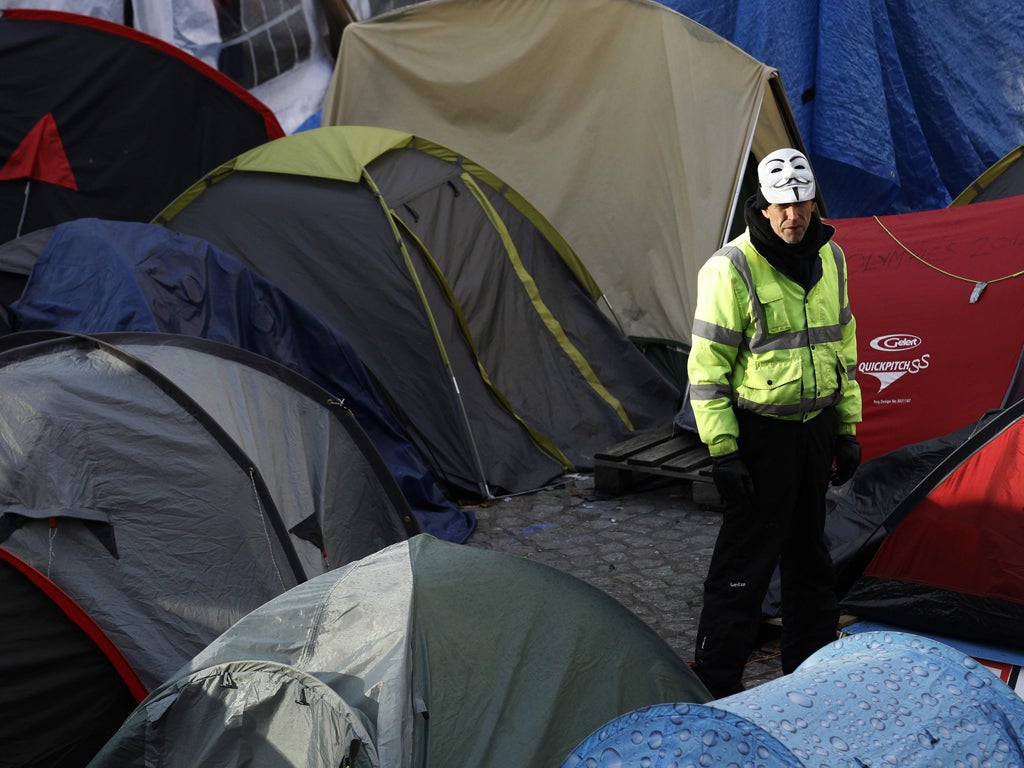'I'd do it all over again, even though it hit my family hard' - Fraser
The priest who backed the Occupy protest stands by his decision to quit St Paul's

Your support helps us to tell the story
From reproductive rights to climate change to Big Tech, The Independent is on the ground when the story is developing. Whether it's investigating the financials of Elon Musk's pro-Trump PAC or producing our latest documentary, 'The A Word', which shines a light on the American women fighting for reproductive rights, we know how important it is to parse out the facts from the messaging.
At such a critical moment in US history, we need reporters on the ground. Your donation allows us to keep sending journalists to speak to both sides of the story.
The Independent is trusted by Americans across the entire political spectrum. And unlike many other quality news outlets, we choose not to lock Americans out of our reporting and analysis with paywalls. We believe quality journalism should be available to everyone, paid for by those who can afford it.
Your support makes all the difference.His decision precipitated a crisis in the Church of England and helped legitimise a protest movement. On 27 October, the charismatic Giles Fraser tweeted he was stepping down as canon chancellor of St Paul's Cathedral.
In his first full interview about the events, Dr Fraser said he stands by his decision, though he regrets the storm that engulfed the Church. The resignation, a matter of loyalty to faith over commitment, left him hunted by the press and facing an uncertain future for his family. But it rekindled his passion for social justice. The Occupy protests resonated with "middle England", he said, adding that the Prime Minister's call for a moral code needed to look at institutions as well as individuals.
Dr Fraser's stand came when the cathedral's chapter voted in favour of a legal action to forcibly move protesters from St Paul's. It polarised a Church charged with acting contrary its teachings – and led to the Dean of St Paul's, the Rt Rev Graeme Knowles, resigning after the Archbishop of Canterbury reluctantly entered the debate.
"It happened quickly but it wasn't in any sense I was uncertain about the decision," Dr Fraser said. "You have a conflict of loyalty. On one hand a loyalty to colleagues, cathedral and chapter. But you have a loyalty to the reason the cathedral was built in the first place. And that has ultimately to be a primary loyalty. It is not that other people don't have that loyalty, they just thought that it ought to be expressed differently. I could not work out how I could stay there and say the things I wanted to say in good conscience, had I been party to a decision to go ahead with an eviction."
First to feel the effects were his family, a wife and three children who will have to move out of their grace and favour home by April. "It means possibly moving my daughter out of school. My eldest is in her GCSE year," he said. "The way I explained the decision to my children was to get a YouTube clip of police very forcibly moving people at Occupy Melbourne. I said, 'We are going to have to change our life and move', they completely got it."
Dr Fraser was warmed by public support – "nearly 1,000 letters, two that were hostile" – as the implications of his decision started to resonate. Other aspects were harder to deal with. "Press were banging on the door, literally bang, bang, bang for half an hour. It is a form of torture. Another newspaper door-stepped my mother. You do get a sense of being hunted. And though I am not frightened of the media attention generally, this was a very intense glare."
Dr Fraser agreed that he has had a tendency to be seen as a free spirit and that he may find it easier to operate without the shackles of institutional responsibilities. "I think I probably need to be in a less Establishment environment," he said. "The Church of England has always had a way of accommodating difference, that's its great strength."
The resignation will allow him to pursue certain aspects of his work. "I think my commitment to social justice has been rekindled. That for me burns brighter than it did before," he said. "The very interesting thing is, part of my job at St Paul's was to engage with the City. I have been trying to do that for two years, which hasn't been easy. The irony is the thing that has made it all possible, and brought an opportunity to do that, is the resignation."
While he remains "totally committed to the Church of England" the resignation will let him support the Occupy movement – which he commends for its ideals but also its lack of leadership that "allows discussion about issues not leaders". "Its messages resonate with ... people in the shires and middle England – the country is not a wholly owned subsidiary of the City."
Dr Fraser also now has the space to be critical of the Prime Minister's call for return to morality. "David Cameron seems to define morality in terms of the individual but there is a common morality and I don't think he gets that aspect of morality," he said. "He doesn't get there are steep structural problems we need to answer."
Join our commenting forum
Join thought-provoking conversations, follow other Independent readers and see their replies
Comments